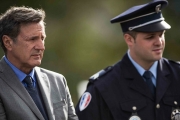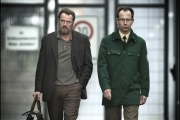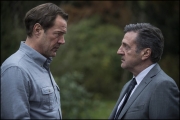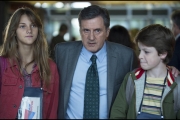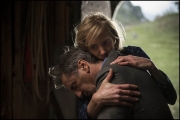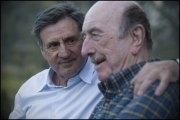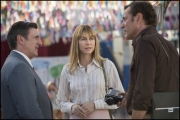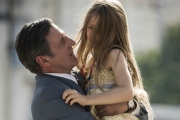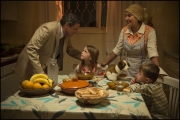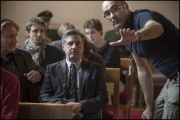July 10, 1982: André Bamberski learns about the death of his 14 year-old daughter, Kalinka, while she was on vacation with her mother and stepfather in Germany. A botched autopsy report raises his suspicions. Convinced that Kalinka’s death was not an accident, Bamberski will dedicate 27 years of his life to bring justice to the case of his daughter, Kalinka.
Cast & Crew
Director • Vincent Garenq
Director of Photography • Renaud Chassaing
Screenwriters • Vincent Garenq and Julien Rappeneau
Based on a true story, based on Au nom de ma fille novel by André Bamberski
Music composer • Nicolas Errera
Producers • Cyril Colbeau-Justin, Jean-Baptiste Dupont, Hugo Bergson-Vuillaume, Serge de Poucques and Sylvain Goldberg
Starring :
Daniel Auteuil, Sébastian Koch, Marie-Josée Croze, Christelle Cornil
Choose a picture to see the filmography (source : IMDB)
![]()
Why did you want to make a film about André Bamberski?
I followed his story and when I read his book, I was overwhelmed by emotion. I read it in a single night.
What did you find so overwhelming about the book?
I was amazed by his perseverance and his tenacity. For 30 years, he never let go, and was absolutely fanatical about making the truth be heard and getting justice for his daughter. Over time, he became a legal expert, and often knew more than his lawyers. Nothing could stop him, and in the end, he managed to overcome the stasis of the French and German justice systems. That was meat and drink for a screenwriter. There is a heroic, very cinematographic side to it, but it is also a story about paternity, which really struck a chord with me because I have two children who are the best things that ever happened to me. Paternity is something fundamental to me and which is at the heart of all my films.
The “heroes” in your films share the fact that they are all real-life people. Why is that?
Because the sincerity and purity that emanates from their stories is very moving, and has an irresistible appeal. They inspire me. I have never found the inspiration for my films within me. I draw it from outside of me, in the lives of others, when something has a particular echo in me. Then, by telling their story, through the process of writing it, I identify with them and that brings a kind of personal ring to it.
I also think that reality is very inspirational, and fertile terrain for a writer. It is often said that it is stranger than fiction. It generates more freshness and sincerity in films. To me, a good story is one that is anchored in reality, in real life. Moreover, I do not like films by “screenwriters”. I can spot the strings they pull, or worse still, the movie-lover references. They do not move me, unlike those that give off a feeling of something actually experienced.
Being able to empathize with people is perhaps necessary for you to make a film. But that is surely not enough. What is the thing that rings the little bell and tells you this is the one?
It needs to be a true story, of course, with rich material and little side plots that can be developed and written into the story. But after that, it is very instinctive. It is like a bolt of lightning, so I cannot give you a rational explanation. Suddenly, the desire is there, and a feeling of urgency that just happens one day helps a lot. It gives you the strength to go and convince a producer to join in the adventure. I have never proposed a subject to a producer without the firm conviction that there would be a film at the end of it. And even when you believe very strongly in it, you sometimes come up against some problems. The plot of The Clearstream affair, for example, really gave me a hard time. It was fascinating, but extremely complex to write.
Do you also need your stories to be “exemplary”?
That is true. All my films are constructed around characters that, on the surface, seem ordinary, but who find themselves in situations that are out-of-the-ordinary, in which they reveal extraordinary character and strength in the face of a prevailing conformity. It is a common thread. And if they are not nonconformist in the start, they end up becoming that way.
Baby Love tells the story of a gay man who has a child. Presumed guilty recounts the story of a man wrongly accused of being a pedophile. The Clearstream affair is about a journalist investigating the world of international finance. And with the character of André Bamberski in In her name, I think I have reached the apotheosis of this kind of character, because he has this capacity for tenacity that is unimaginable for ordinary mortals!
You are a fiction filmmaker, not a documentary Filmmaker. How do you respect the truth of these people whose lives you explore?
I kept those concerned people informed. I tell them right at the start that we are going to tell their story as accurately as possible, but that, despite all the precautions we might take, they will not see a 100% accurate portrait of themselves in the film. Because adapting a story for the screen means cheating a little. Even if that only means simplifying things in order to tell 30 years of history in 90 minutes of film. So the challenge is to reinterpret their story, while ensuring that in the end, they still recognize themselves, and all the while making a movie! My worst nightmare would be that they feel betrayed in the end by a film that is supposed to tell their story. They get to see every version of the script, and I keep them informed at every stage in the process of making the film. During the shoot, I sent stills from the film to André Bamberski.
That way, André was able to “digest” the film with us, to be better prepared for when he would see his story in the finished film. And in the end, when he saw it, he seemed satisfied. I do not remember the exact words he used, but he mentioned “good work” and “dignity”. Right from the start, he was delighted with the choice of Daniel Auteuil. And in the end, I think he was very satisfied with his performance and his modesty.
How did you choose which scenes to keep in the film?
The most hard-hitting scenes in the film were already suggested in the book. The autopsy, the exhumation of Kalinka’s body, the testimony of the young girl raped by Krombach that she gave during the trial in Germany – all the most powerful scenes were inspired by reality. In terms of the legal process, we had to simplify things a great deal. You can imagine what 30 years of legal wrangling represents. We just focused on the absolute essentials, taking care not to lose any of the tension in the film.
The film could have come across as mere sentimentality because of its subject matter, but in fact, it gives off a great deal of emotion and at no point does it lapse into voyeurism.
I have a theory about emotion – the more you hold it back the more it comes bursting out. I never seek to push the emotion in a film by thinking that “the audience is definitely going to cry at one specific moment”. I prefer to hold it back, keep it modest and dignified, and never slip into melodrama, leaving viewer free to cry where and when he or she wants to. I think that André Bamberski, a very modest man, greatly appreciated that. Daniel Auteuil is also somebody who doesn’t like displaying too much emotion.
Since I began making films, I’ve always forced myself never to give way to easy emotion or trigger any kind of voyeurism. That is why I do not like it when people associate me with “public interest stories”, as if I were some kind of sensationalist filmmaker. I do not think that generalization applies to me. I make portraits of people. It is people like Alain Marécaux, Denis Robert and André Bamberski who draw me to their stories. It may be that their stories are of public interest, but that is not what draws me in the first place. It is their experiences.
Did you meet Kalinka’s mother?
André Bamberski suggested to do so. And she agreed to give us her version of the facts, which is therefore also represented in the film. Once again, André was not totally in agreement with that version of events, but he was open enough to allow that other point of view to feature in the film. It was very satisfying to be able to do that, given that the two of them no longer speak to each other in real life. A writer must love all his or her characters and must understand them. And for this character, who raises plenty of questions in the film, I restricted myself to a very simple viewpoint: she is in denial. That is the only defense mechanism she could find in order to cope.
Why did you choose Daniel Auteuil to play André Bamberski?
He was an obvious choice. When I started to write the film with Julien Rappeneau, I immediately thought of him and was unable to envisage anyone else for the role.
Daniel is a brilliant actor, he has this exceptional inner presence and can convey the absolute devastation he is experiencing on the inside through a simple glance, like he does in The Adversary or A heart in winter. We have missed seeing him perform in that register, and I think people will be delighted to see it once again in this film. The role was made for him. And luckily enough, he immediately agreed to take on the part.
The esthetic of your film also contributes greatly to the rigor it conveys. Colors, the lighting, sets, and even camera movements – all these elements contribute to the same desire for sobriety . . .
I try to put the veracity of the story and the characters first, to make people forget they are watching a film. So a certain sobriety is essential. In terms of the colors of the film, there was no special treatment. There is just the contrast of the sunny light of Morocco, and the grayness of Germany. That contrast allowed us to vary the moods in the film and to give the impression of years passing.
For the sets, we chose to shoot in the Pyrenees to best convey a feel of the provinces, and to show some sublime landscapes. André Bamberski actually lives in Toulouse, but it seemed to us that Pau best embodied a small town in the 1970s. And then we found the house built below a cemetery. It simply had to be the place where most of the action would take place. I always pay a great deal of attention to sets and to music. They bring an additional dimension to a film.
What image would you like audiences to take away of your André Bamberski? That of a man whose love for his daughter has matured?
For sure. It is as if he has turned her horrendous disappearance into a touching story of love and duty. It is very difficult to put it into words, to analyze why this story gives off such beauty, such poetry, why it touches us so much. One of the first people to see the film told me she would have liked to have had a father like him. Thinking back to her reaction makes me want to cry. That is it. Perhaps this story is just a wonderful tale of the love of one father for his daughter.
Press Kit “Au nom de ma fille”
English ~ 9 pages ~ 163 Ko ~ pdf
Press Kit “Au nom de ma fille”
French ~ 15 pages ~ 1,6 Mo ~ pdf



